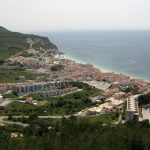Fátima Perdigão – an irrepressible fighter
Fátima Perdigão has been a consistent, and indefatigable part of Portugal’s property landscape for 35 years. Chris Graeme looks back at a career that was not always easy.
Fátima Perdigão is one personality on the Portuguese property scene that once met is never forgotten.
A charming smile and inbuilt sense of elegance and poise belies a tough battle in a life where nothing was handed on a silver platter. On the contrary, she has been to fighter and a career-driven woman all of her life.
Born and raised in Mozambique, she lost her father at 15. Fátima started her career in banking becoming the manager of a branch of Montepio de Moçambique. On marrying her husband Carlos she moved to Pretoria, South Africa and continued her banking career at Banco of Lisbon and South Africa and First National Bank of Pretoria. “I did a lot of training and sat exams, getting 93% in one, and so worked my way up”, she recalls.
However, tragedy struck and Carlos was killed in a car crash aged only 43, leaving Fátima a widow at 35. “I was very down, but I had three girls to support, I simply had to get on with it and work”.
The political situation in South Africa was increasingly volatile. Fátima’s mother was in Portugal which she had visited with her girls. “I thought I would move and give Portugal a try in 1987. Even through I didn’t really know anyone else there. It was a case of move now or never, because once my girls had startled to settle with their friends and begin higher education, it would have been more difficult”, she explains.
Because Fátima knew banking, on moving to Portugal her plan was to apply to join BCP. “In Portugal the banking world was very male-dominated at that time, and there were few opportunities for women. Of course, I was already in my late 30s, had no university degree other than the university of life — my experience and knowledge”.
Enter Hans Koster
Once in Portugal, Fátima realised she needed a job. Her aunt had spotted an advert in a newspaper for a new company and suggested she apply.
“I was interviewed by a Mr. Hans Koster (Today Chairman of Holmes Place Portugal) at the Swedish Embassy for the job title ‘Executive Assistant for European Tax Free Shopping’. The company was to organise VAT returns to tourists. I started working for him, and when he became the Managing Director of the Portugal subsidiary of Swedish developer Aranãs, I continued on with him as Director of Marketing and Sales”, she recalls.
Aranãs had offices in Edifício Suecia in Lisbon, a new 10,000m2 office development that the company was working on. “I remember one of the first things I had to do was call up the restaurant that served ‘Sela de Borrego’ (Rack of Lamb Alentejo style). I’d never even heard of the dish and was too shy to ask Hans, who knew, where they served it. There was no Google then and I called half the restaurants in Lisbon. Of course, he meant a famous one in Guincho”.
Fátima looks back at her time with Aranãs fondly. “We had so many good projects and fantastic tenants wanting to move into our properties. Hans Koster was a true visionary with great, forward-looking ideas and still is”.
“However he was a macro-manager, he didn’t like to micromanage. Details were not for him, and this with my past experience and sense of organisation is where I came in”.
“You have to understand I was starting from scratch. I didn’t know anyone and I had to get used to all the jargon and terms that we simply didn’t have in South Africa.
Fátima describes Aranãs as a “very small company with huge investments”. “We had a huge portfolio, not just the Parque Suecia buildings (5 office blocks covering10,000m2) in Lisbon which we built, but a hotel in the Algarve, other offices in Lisbon, and parcels of development land.
One such “huge investment” was the purchase of Quinta da Fonte in 1991, a farm estate surrounding an old manor house on the outskirts of Oeiras. Little did Fátima know at the time, but the development of an office park project there would come to define her professional career.
“I was involved with the Quinta da Fonte project, in one way or another, from the start. It was originally the brainchild of Aranãs CEO Lars Carlson and Hans Koster when it was nothing more than a tumble-down overgrown estate with a large house and plots of farmland”, she recalls.
In 1999 Akeler bought the assets at Quinta da Fonte Business Park and Fátima was asked to manage them. “I had already been involved in the property management, as well as the development and marketing, and so it was no problem for me to manage the properties”, she says.
The Pramerica Years
Quinta da Fonte was sold on to a German fund in 2001 and in 2003 Fátima was appointed the managing director of Pramerica Portugal, a subsidiary of Pramerica Real Estate Investors (today PGIM Real Estate) which would now manage the Quinta da Fonte assets.
At its height Pramerica had around 130,000m2 of property under management – much of it office space – on the Iberian peninsula.
Step by step Quinta da Fonte grew into an office park with 17 buildings by 2012. (today it has 21 and 60 companies)
Looking back to the Pramerica Years, she laughs and says: “I must have been one of the few people to have worked for all these different companies without ever having left the building!”
In September I caught up with Fátima Perdigão at Quinta da Fonte’s 30th Anniversary. “I think they have brought more life into the park. Although there is Oeiras Shopping nearby, you had to have a car. With the Central Square there is a place to meet, drink, have lunch, a Holmes Place gym, a hairdresser, shops, a spa, and other leisure facilities”.
“The most important work they did, and which we started, was the dual carriage and viaduct access road because it reduced the traffic problem of the never-ending queues at rush-hour periods. This new improved traffic flow has given Quinta da Fonte the opportunity to expand”, she adds.
Fátima Perdigão also points to the garden landscaping and management at the office park by Richard Westcott’s landscaping company Jardim Vista, which has “improved Quinta da Fonte immeasurably with the green areas looking clean, well-tended and really lovely”.
Working with different nationalities
With her flawless English Fátima has had to opportunity to work with a wide range of nationalities. “I’ve been very happy with my career in the real estate business. I’ve worked with English, German, Swedish and Spanish and never had problems with any of them.”
Fátima says that with the British and Swedes she had an intermediary to report to. When she went to work for Pramerica she was the face and didn’t work with anyone locally.
“It was a very exciting and interesting experience working for both Aranãs and Pramerica. I travelled a lot and even showed the King of Sweden around Quinta da Fonte in 1998.
When Pramerica’s Madrid office closed Fátima dealt with all the assets divestment and property sales through the Portugal office as the company was being wound up from 2015, although she continued to manage one remaining office building in Parque das Nações and helped oversee the sale for the Luxembourg fund that owned it.
Selling luxury
Never one to do nothing, on retiring Fátima decided to do voluntary work at Hospital of Cascais helping people at the reception, and SOS Família which helps families in the Estoril Parish of São António in need; a need that was particularly pertinent during the Covid-19 pandemic.
Today, at the age of 72, Fátima works for the luxury estate agents Citylux (OceanSide Group) in Cascais, not because she has to, but because she loves it and has always loved working. “Whatever I done in my life I like to really be part of the team, throw myself into it and give it all that I have”, she says.
“I would never want to stay at home doing nothing, but at the same time I also wanted to have the kind of work where you can work from home and work from the office twice a week”.
I ask Fátima Perdigão how she sees the Lisbon commercial and luxury residential markets developing over the next two years, and if current fears of a crash in the real estate market are likely.
“I think it depends very much on the progress of the War in Ukraine and how long it goes on. If it comes to an end quickly, I think the Portuguese residential market will only suffer some readjustments. If it drags on, continuing to effect energy and raw material prices and supply chains, then we could see the property market suffer”.
Fátima tells me that she recently attended a Women in Property event in Lisbon. I ask her if she still thinks that big business is still dominated by men in Portugal? “It’s no longer true and things have changed a lot. All of us at the event have had good experiences in our careers. When I started in real estate in the 1980s and 1990s, the so-called ‘Golden Era’ for property in Portugal, there were not many women in senior management. That’s not the case today”, concludes Fátima Perdigão.










